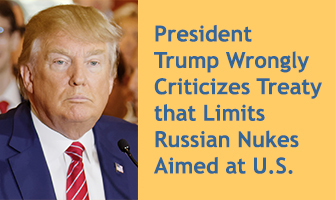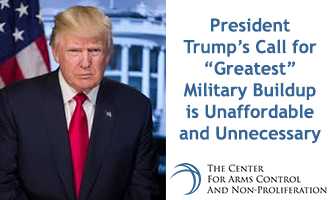
The Administration’s Habit of Demanding Everything While Offering Little to Nothing Will Never Succeed
Daniel Larison / The American Conservative
(October 21, 2020) — The Trump administration has gone through the motions of negotiating arms control agreements while doing everything they can to make it all but impossible for the other governments to agree to their terms.
The president has made a habit of tearing down existing arms control and nonproliferation agreements over the last four years, and he has replaced them with nothing. He has withdrawn from or reneged on the INF Treaty, the Open Skies Treaty, and the JCPOA, and he has dragged his feet on extending New START because he didn’t care whether the treaty survives.
Despite paying lip service to wanting “better” deals, Trump has been content to tear down what his predecessors built, and the US and the world will be worse off because of it.

Trump’s feigned interest in new agreements with North Korea, Iran, and Russia has been contradicted by the extreme and unrealistic demands that he and his officials have made. Negotiations with North Korea fell apart following what some experts have dubbed the “Hanoi Hold-up,” where the US demanded sweeping disarmament concessions from North Korea in exchange for partial sanctions relief.
New START extension has been held hostage to a maximalist set of demands that would require Russia to make greater concessions than it has ever made in the history of arms control. These heavy-handed tactics and far-fetched demands have predictably yielded next to nothing, and that is exactly what hard-liners in the administration have wanted.
They didn’t want substantive negotiations to succeed, but they wanted to be seen making the effort to negotiate in order to pin the blame on the other side.
The US and Russia are reportedly getting closer to reaching some limited pre-election deal that would involve a political agreement to “freeze” both states’ arsenals while extending New START for just one year. It has not happened, and it might still fall apart, but it’s worth reflecting on how unimpressive this deal is if it does happen.
After making outlandish demands to include all of Russia’s nuclear weapons and even China’s arsenal as part of a new agreement in the mistaken belief that they could force Russia to give in, the administration is now coming away with virtually nothing. A one-year extension of the only remaining arms control treaty is the thinnest of gruel when it would have been possible to get an unconditional five-year extension many years ago.

In recent weeks, even this very minor agreement seemed out of reach. Russia publicly dismissed claims by US officials that the two governments had reached an “agreement in principle” on a freeze of both states’ nuclear arsenals before next month’s election:
Russian Mission Vienna @mission_rf October 14, 2020, DFM S.#Ryabkov: We are well aware of #US position on freeze and it’s unacceptable for us as this needs to be tackled together w/ other #StrategicStability issues – delivery vehicles,space, US-made missile defense & their growing nonnuclear strategic offensive arms arsenals
Each time that the US envoy, Marshall Billingslea, has reported progress in talks with the Russians, Russian officials have been quick to reject this and emphasize how far apart the two sides are. “Washington is describing what is desired, not what is real,” Deputy Foreign Minister Ryabkov has said, and he might well be referring to the Trump administration’s approach to all arms control and nonproliferation negotiations.
There is still some reason to think that Russia will still balk over the question of verification:
Vladimir Frolov @ vfrolov (Oct. 20, 2020) The US is misreading the Russian counter-offer. We agree to a one-year freeze on all warheads without any onerous verification measures. We are not going to do warhead verification for a one-year meaningless deal.
Moscow has had little incentive to give Trump a gift before the election when the administration has played games with New START extension for years. The administration assumed that delay would force Russia to compromise, but they overestimated Moscow’s need to extend the treaty and they misjudged which side had the leverage in the negotiations.
As they always do, the administration wrongly believed that they had the upper hand and Russia would have to accept their terms in full, but as the election has drawn closer, the Russian position has only hardened as they realize that they are far more likely to have real arms control discussions with a Biden administration.
For his part, Biden has committed to extending New START by the full five years permitted under the treaty, so Moscow will be able to make a more lasting agreement next year.
Trump’s antipathy to arms control in general and New START in particular has hardly been a secret. The first time he spoke to Putin about it in 2017, he denounced it as another bad Obama-era deal, and his position has not really changed. Even after Bolton left the administration last year, US intransigence on extending the treaty remained the same.
Republican hawks have never liked arms control agreements, and they especially dislike those negotiated by presidents from the other party. That is why getting enough Republicans to vote for ratification in 2010 was like pulling teeth, and it is why Trump’s willingness to put New START in jeopardy has provoked so little resistance in his own party.
The administration’s inflexible, hard-line approach to all of its negotiations has always been a recipe for diplomatic failure. It is not surprising that other governments don’t respond well to ultimatums that require them to give up far more than they are being offered in exchange.
The fact that the administration keeps issuing these ultimatums after so many rejections shows that they have never been interested in finding an acceptable compromise, but prefer instead to be seen taking a “tough” position regardless of the consequences for US and allied security.
Last week also saw the display of what appeared to be a new North Korean ICBM. That was just the latest reminder that North Korea has not made any binding commitments to limit or reduce its nuclear arsenal. On the contrary, they have continued to improve and expand that arsenal as any emerging nuclear weapons state would.
The president’s preference for substance-free showmanship was good for a few photos and positive headlines two years ago, but it could never achieve anything real and lasting. The president had no interest in that, and did none of the work necessary to achieve it.
There was an opportunity to pursue a realistic arms control agreement with North Korea in the last two years, but it was squandered because the administration would not settle for a compromise and refused to meet North Korea halfway on sanctions relief. In the end, the same rigid and unreasonable hostility to arms control won out, and now North Korea’s arsenal will keep growing unchecked.

The US has benefited from decades of arms control agreements with Moscow, which first limited and then significantly reduced the world’s two largest arsenals. These agreements provided a degree of stability and certainty in US-Soviet and then US-Russian relations that we have all come to take for granted, and we should not want to lose that.
These agreements have not only prevented an arms race, but they have served as the basis for more constructive relations on other issues as well. US-Russian relations have deteriorated so much in the last 10 years, but extending New START could be the start of an effort to repair them.
Trump had the opportunity to do that at any point during the last four years, but he wasted all that time so that he could cater to hard-liners instead.
It is one of the many absurdities of the Trump years that a president who is supposedly so eager to have good relations with Russia will not fully extend a successful agreement that is widely supported in both countries. If Trump had wanted serious, productive negotiations with Russia on arms control, he could have agreed to extend New START at the beginning of his presidency and used that treaty as the foundation for further talks, but he had no interest in that.
Now the administration is desperate to rack up superficial “wins” before the election, and the agreement that is apparently being negotiated isn’t much better than a PR stunt.
The failure of the Trump administration’s forays into arms control is a lesson in how not to practice diplomacy. The US has to be willing to compromise if it expects other governments to make concessions, and if it wants to demand more from the other party it has to be willing to offer more in return.
The administration’s habit of demanding everything while offering little or nothing will never succeed, and when we see an administration that tries to “negotiate” this way we can conclude that they are operating in bad faith. Hard-liners love to use this kind of pseudo-engagement as a way of discrediting diplomacy so that they can agitate for more aggressive policies after the phony “diplomacy” inevitably collapses.
If we want US foreign policy to rely more on effective diplomacy instead of defaulting to sanctions and military options, we need to recognize the difference between genuine engagement and the fake version that the Trump administration has been peddling for the last four years.
Daniel Larison is a senior editor at TAC, where he also keeps a solo blog. He has been published in the New York Times Book Review, Dallas Morning News, World Politics Review, Politico Magazine, Orthodox Life, Front Porch Republic, The American Scene, and Culture11, and was a columnist for The Week. He holds a PhD in history from the University of Chicago, and resides in Lancaster, PA.
Posted in accordance with Title 17, Section 107, US Code, for noncommercial, educational purposes.